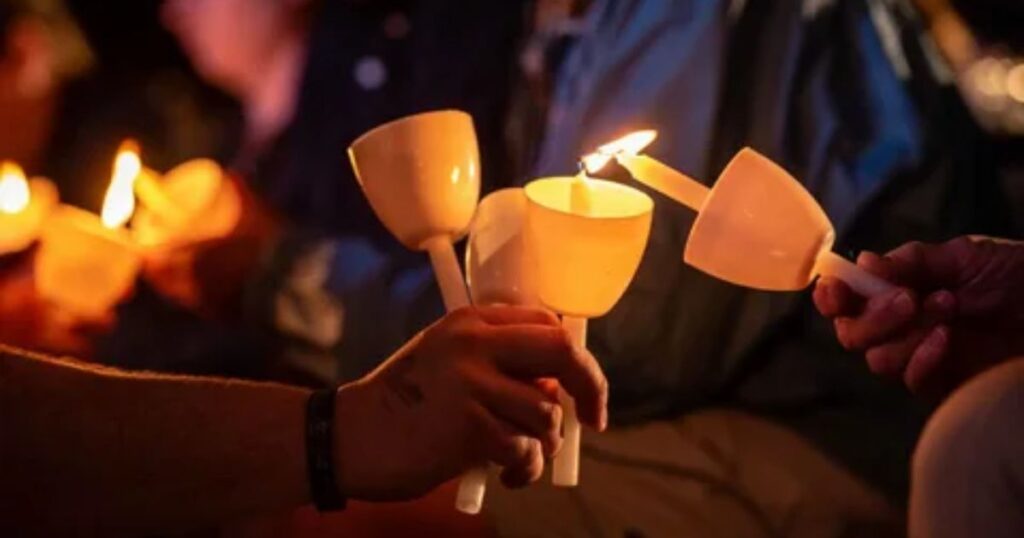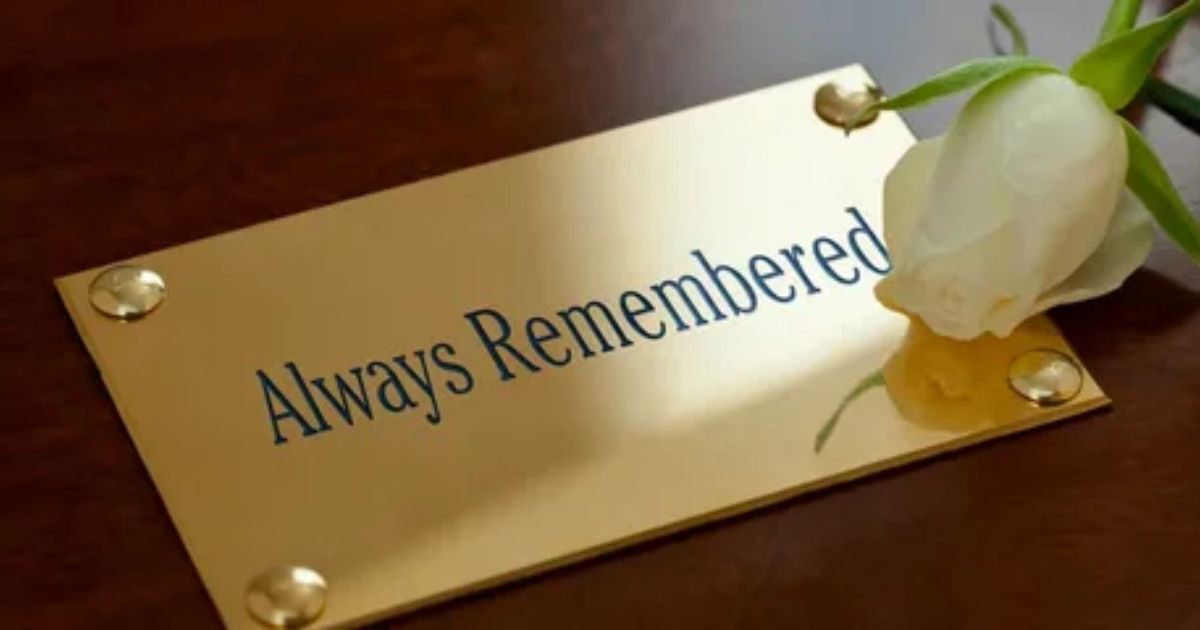Memorial services are profound moments of collective grief, remembrance, and celebration of life. These gatherings serve as a crucial opportunity to honor a loved one’s memory while providing support to those who are mourning.
Knowing what to bring and how to comfort yourself can make a significant difference in providing comfort during these emotionally challenging times.
This comprehensive guide offers 12 thoughtful gifts to supporting bereaved families, ensuring your presence and contributions are both meaningful and respectful.
Common Gifts & Tokens To Bring To A Memorial Service
Memorial services are deeply personal moments that call for thoughtful, meaningful gestures of support and remembrance. While the act of attending and offering emotional support is paramount, bringing a carefully chosen gift can provide additional comfort to grieving families.
The most impactful memorial service gifts transcend material value, instead offering a tangible representation of love, memory, and support during one of life’s most challenging moments.
Selecting the right gift requires careful consideration of the deceased’s personality, the family’s grief, and the delicate nature of the occasion. The most meaningful tokens are those that honor the individual’s life, provide practical support to the bereaved, or create a lasting memory that celebrates the person’s unique journey.
Flowers
Flowers have long been a profound way to express sympathy and honor the memory of a loved one. Each flower carries its own symbolic meaning, which can add depth and personal significance to your gesture of remembrance.
When selecting flowers for a memorial service, consider the deceased’s personal preferences, cultural background, and the subtle language of floral symbolism that can speak volumes about your respect and love.

Symbolic Meanings of Flowers
- White lilies traditionally symbolize innocence and peace, making them a common choice for memorial services.
- Roses can represent love and respect, with different colors conveying nuanced emotions.
- white roses signify purity and reverence,
- pink roses express gentle remembrance.
- Chrysanthemums are particularly significant in many European cultures as flowers of mourning and tribute.
Sympathy Cards
Writing a sympathy card is a delicate and deeply personal act of compassion. It’s an opportunity to offer comfort, share a memory, or express your support to those grieving.
The most meaningful cards go beyond generic condolences, instead offering specific, genuine sentiments that acknowledge the unique life of the deceased and the pain of loss. Remember that your presence and genuine care matter more than crafting a perfect message.
Crafting a Heartfelt Message
When you write a sympathy card then you should know about its importance, Here are some tips:
- Consider sharing a specific memory that highlights the person’s character, or express how their life impacted you.
- It’s important to be sincere and authentic, avoiding clichés or attempts to minimize grief.
- If you’re struggling to find the right words, sometimes a simple expression of love, a shared memory, or even an acknowledgment of the difficulty of the moment can be most powerful.
Memorial Donations
Memorial donations provide a meaningful way to honor a loved one’s memory while supporting a cause that was important to them or their family. Some people donate to charities instead of flowers, sympathy cards. It is also a good consideration for your loved ones.
- Choosing the Right Charity
When choosing a charity, consider the deceased’s passions, values, or the circumstances of their life and death. If they were passionate about education, you might donate to a scholarship fund.
For those who battled a specific illness, a medical research foundation could be appropriate. Some families specify a preferred charity in the obituary or memorial service information, which provides clear guidance.
- How Much Should I Donate At A Memorial Service
The amount to donate is a personal decision that depends on your relationship with the deceased, your financial situation, and local customs. Typically, memorial donations range from $25 to $100, but there’s no strict rule.
The thoughtfulness of the gesture matters more than the amount. Some people choose to donate an amount that has personal significance, such as the deceased’s age or birth year. If you’re unsure, consulting with close family members or following any specific wishes outlined by the family can help guide your decision.
Host a Candlelight Vigil
A candlelight vigil creates a solemn, reflective atmosphere that allows mourners to come together in shared grief and remembrance. The soft, flickering light symbolizes hope, memory, and the enduring spirit of the loved one who has passed.

Planning a meaningful candlelight vigil involves:
- Selecting a significant location with personal meaning
- Providing candles and matches for all participants
- Creating a moment of collective silence or shared remembrance
- Allowing space for spontaneous sharing of memories
- Ensuring safety protocols for candle handling
Thoughtful Gifts To Bring To A Memorial Service
The thoughtful gifts capture the essence of the person who has passed away, reflect the depth of your relationship, and provide comfort to those grieving.
Whether through personalized mementos, symbolic jewelry, or carefully curated remembrance items, these gifts serve as lasting tributes that help keep the memory of a loved one alive.
Laser Engraving
Laser engraving offers a deeply personal way to create lasting memorials that capture the unique spirit of a loved one. This precise technique allows for intricate personalization on various materials, transforming ordinary objects into cherished keepsakes.
Individuals can choose to immortalize special memories through carefully selected designs, quotes, or personal messages that speak directly to the heart of remembrance.

Key opportunities for laser engraving include:
- Personalized memorial plaques with meaningful quotes or dates
- Customized picture frames highlighting special moments
- Engraved wooden boxes or keepsake containers
- Memorial stones or garden markers
- Customized glassware or metal surfaces with significant imagery
Memorial Jewelry
Memorial jewelry provides an intimate and personal way to keep the memory of a loved one close. These pieces serve as constant, wearable reminders of cherished connections, allowing individuals to carry a piece of their loved one’s memory with them always.
From delicate lockets to sophisticated commemorative pieces, memorial jewelry transforms grief into a beautiful, personal expression of love and remembrance.
Popular memorial jewelry options include:
- Cremation jewelry that holds a small portion of ashes
- Engraved pendants with significant dates or coordinates
- Photo lockets featuring beloved images
- Birthstone-incorporated memorial pieces
- Fingerprint or handwriting jewelry
- Memorial bracelets with meaningful inscriptions
Charms
Charm collections offer a versatile and deeply personal approach to memorializing a loved one. These small, meaningful tokens can be collected over time, creating a narrative of remembrance that grows and evolves.
Each charm can represent a different aspect of the person’s life, personality, or shared memories, allowing for a truly unique and personalized memorial.
Meaningful charm options include:
- Symbolic charms representing the person’s hobbies or passions
- Date or initial charms marking significant life moments
- Angel or memorial-specific themed charms
- Birthstone or zodiac-related charms
- Custom-designed charms that tell a personal story
Gift Boxes
Memorial gift boxes provide a comprehensive and thoughtful way to compile multiple meaningful items into a single, deeply personal tribute.
These carefully curated collections can include various mementos, photographs, written memories, and small keepsakes that collectively celebrate the life and legacy of a loved one.
A well-designed memorial gift box becomes a treasured repository of memories, offering comfort and connection to those who are grieving.

Considerations for creating memorial gift boxes:
- Include personal photographs and written memories
- Add small, meaningful objects that represent the person’s life
- Incorporate items that showcase their interests and personality
- Include a heartfelt letter or collection of messages from loved ones
- Use a beautiful, high-quality box that can be preserved and cherished
Scatter Ashes in a Meaningful Place
Scattering ashes is an intimate and personal way to honor a loved one’s final wishes and create a lasting connection to a place that held special significance. This act can provide closure and a sense of peace for those left behind.
Key considerations for scattering ashes:
- Obtain necessary permissions for the chosen location
- Check local and environmental regulations
- Consider the emotional impact on family members
- Choose a location with personal meaning to the deceased
- Plan a small ceremony or ritual to accompany the scattering
- Bring biodegradable urns or scattering tubes if appropriate
Release Butterflies
Butterfly releases have become a beautiful, symbolic way to commemorate a loved one’s life, representing transformation, hope, and the journey of the soul.
This gentle ritual can provide a sense of peace and spiritual connection for those grieving.

Important aspects of a butterfly release:
- Choose native, ethically sourced butterflies
- Consider the time of day and weather conditions
- Prepare a meaningful ritual or reading to accompany the release
- Ensure proper handling and release of the butterflies
- Provide guests with individual butterflies or coordinate a collective release
Personal Touches To Bring To A Memorial Service
In times of loss, personal touches can provide immeasurable comfort to grieving families. These thoughtful gestures go beyond traditional condolences, offering tangible expressions of love, remembrance, and support.
By bringing items that celebrate the life and memories of the deceased, you create meaningful connections that help those mourning to feel surrounded by love, share memories, and begin the healing process.
Handwritten Letters
Handwritten letters are powerful tools of emotional connection during times of grief. They provide a deeply personal way to express sympathy, share memories, and offer support to those experiencing loss.
Writing a Personal Letter
A well-crafted letter can become a cherished keepsake that provides comfort in the difficult days of mourning.
Key elements of a meaningful memorial service letter include:
- Specific memories of the deceased
- Acknowledgment of their impact on your life
- Genuine expressions of sympathy
- Offers of practical support
- Sharing of personal stories that highlight their character
Photographs and Mementos
Photographs are windows to cherished memories, capturing moments of joy, love, and connection.
Creating a Memory Album
A memory album serves as a powerful tribute that celebrates the life of the lost loved one, providing a tangible way to preserve and share their legacy.
Important considerations for creating a memorial album:
- Collect photos from various periods of the person’s life
- Include candid moments as well as formal portraits
- Add captions or short stories to provide context
- Invite family and friends to contribute their favorite memories
- Consider both digital and physical album options
Keepsake Items
Keepsakes are tangible reminders of a loved one, offering comfort and connection to those left behind.
Choosing a Keepsake
These items serve as personal memorials that can be treasured for years to come, helping to keep the memory of the deceased alive.
Considerations when selecting a meaningful keepsake:
- Choose items with personal significance
- Consider the deceased’s hobbies or passions
- Select something that can be shared among family members
- Look for items that can be passed down through generations
- Think about practicality and emotional value
Arrange a Themed Memorial
Creating a themed memorial service provides a deeply personal way to celebrate a loved one’s life, transforming a traditional gathering into a meaningful tribute that reflects their unique personality and passions.
A well-planned theme can help mourners connect with positive memories and celebrate the individual’s life story.
Key considerations for a themed memorial include:
- Select a theme that authentically represents the deceased’s interests or lifestyle
- Incorporate meaningful decorations, music, and attire that reflect the chosen theme
- Create display areas that showcase the person’s achievements, hobbies, or cherished possessions
Host Live Music
Live music can be a profoundly healing and emotional component of a memorial service, offering a powerful way to connect with memories and express grief. Music has a unique ability to evoke emotions, trigger memories, and provide comfort during times of loss.
Considerations for incorporating live music:
- Choose musicians or musical styles that were meaningful to the deceased
- Select a mix of somber and uplifting pieces to reflect the complexity of grief
- Consider live performances by family members or close friends
- Include the deceased’s favorite songs or genres
Decorate a Memory Tree
A memory tree serves as a powerful visual representation of a loved one’s life, allowing mourners to share personal memories and create a collective tribute.
This symbolic approach transforms grief into a collaborative and healing experience, providing a tangible way for people to express their feelings and remembrances.
Elements of a memory tree can include:

- Hanging cards, photos, or written memories on tree branches
- Using a real tree or a decorative tree-like structure
- Providing various materials like colored paper, ribbons, or tags for guests to share memories
- Placing the tree in a prominent location during the memorial service
Practical Contributions To Bring To A Memorial Service
Food and Meals
During times of grief, practical support can be incredibly meaningful. Providing meals helps families focus on mourning and healing without the added stress of daily responsibilities.
Meal Train and Coordination
A well-coordinated meal train can be a lifeline for those experiencing loss.
Key aspects of meal support:
- Coordinate with family or close friends
- Consider dietary restrictions and preferences
- Provide easily reheatable meals
- Include disposable containers for convenience
- Offer flexible delivery options
Household Supplies
Practical household support can be an invaluable way to show care during difficult times.
Essential Supplies
Simple supplies can help ease the burden of daily tasks for grieving families.
Essential supplies to consider:
- Disposable plates, utensils, and cleaning supplies
- Paper towels and toilet paper
- Simple pantry staples
- Basic cleaning products
- Disposable food storage containers
What To Wear To A Memorial Service
Appropriate Attire
Choosing the right attire for a memorial service is about showing respect while remaining comfortable and supportive.Your clothing should communicate sympathy, reverence, and support for the grieving family.
General guidelines for memorial service attire:
- Opt for subdued, conservative colors
- Choose comfortable, respectful clothing
- Avoid overly casual or flashy outfits
- Consider the venue and cultural context
- Prioritize clean, well-maintained clothing
Thoughtful Presentation
The way you present yourself at a memorial service can provide additional comfort to those mourning. Your appearance and demeanor can offer silent support during a difficult time.
Tips for thoughtful presentation:
- Minimal, understated accessories
- Neat, clean appearance
- Soft, muted colors
- Comfortable but formal clothing
- Considerate body language and demeanor
Using Digital Condolences For A Memorial Service
In the digital age, expressing sympathy and honoring a loved one’s memory has expanded beyond traditional methods. Online platforms now offer unique and meaningful ways to connect, remember, and support grieving families.
These digital tools provide opportunities for shared mourning, memory preservation, and collective support that transcend geographical boundaries, allowing friends and family to come together virtually in times of loss.
Online Memorials
Online memorials have become a powerful way to celebrate and remember a loved one’s life in the digital realm. These virtual spaces serve as digital tributes that can be accessed, contributed to, and revisited by friends and family from around the world.
They offer a lasting, interactive platform for sharing memories, photographs, and stories that capture the essence of the deceased.
Contributing to Online Memorials
When participating in an online memorial, consider the following ways to contribute meaningfully:
- Upload personal photographs that showcase significant moments in the loved one’s life
- Write detailed, heartfelt stories or memories that highlight their character
- Share meaningful quotes or personal anecdotes that capture their spirit
- Create digital collages or video montages celebrating their life
- Respect the privacy and wishes of the bereaved family in your contributions
Social Media Etiquette
Social media has become a complex landscape for expressing condolences, requiring sensitivity, respect, and thoughtful consideration.
While these platforms offer immediate connection, they also present challenges in navigating grief and privacy in a public digital space.
Guidelines for Social Media Condolences
Observe these important guidelines when expressing condolences online:
- Wait for official announcements before posting about the loss
- Keep messages private and personal, avoiding overly public displays
- Avoid sharing details about the death without family permission
- Use compassionate, supportive language
- Offer specific support rather than generic statements
- Respect the family’s grieving process and digital boundaries
How To Plan Ahead When Attending A Memorial Service
Proper preparation can help alleviate stress during an already difficult time, allowing you to focus on supporting the grieving family and honoring the deceased.
Thoughtful planning demonstrates respect and ensures you can be present both emotionally and logistically.
Confirming Details With Family Or Funeral Home
Gathering accurate information is crucial for attending a memorial service respectfully and appropriately. Early communication helps prevent misunderstandings and shows your genuine care during a challenging time.
Sources for Information
Key sources to confirm memorial service details include:
- Official obituary announcements
- Direct communication with immediate family members
- Funeral home websites or contact information
- Local funeral notices
- Social media memorial pages or event invitations
Travel Arrangements
Planning your travel requires careful consideration of both practical and emotional factors. Your presence can provide significant comfort to grieving loved ones, making the effort to attend particularly meaningful.
Travel Tips
Consider these practical travel recommendations:
- Check the exact date, time, and location of the memorial service
- Investigate local accommodation options near the service venue
- Plan to arrive with sufficient time to handle unexpected delays
- Pack appropriate, respectful attire
- Consider potential emotional challenges and prepare accordingly
- Arrange transportation that allows you to be present and supportive
Supporting the Bereaved During & After A Memorial Service
During times of profound loss, the support of friends, family, and community becomes a crucial lifeline for those grieving. Navigating grief is a deeply personal journey, and meaningful support requires empathy, patience, and a willingness to be present in both practical and emotional ways.
The period surrounding a memorial service is particularly sensitive, as mourners are processing their loss while also managing numerous practical and emotional challenges.
Offering Emotional Support
Emotional support is the cornerstone of helping someone through grief. It’s about creating a safe, non-judgmental space where the bereaved can express their feelings freely and feel truly heard.
Ways to Provide Emotional Support
The most powerful support often comes from simple, genuine gestures of compassion and understanding.
Key ways to provide emotional support include:
- Listen actively without trying to “fix” their grief
- Acknowledge their pain without minimizing their loss
- Allow them to express a range of emotions without discomfort
- Avoid giving unsolicited advice or platitudes
- Validate their feelings and unique grieving process
- Be patient and understanding of their emotional ups and downs
Practical Help
Practical support can be just as meaningful as emotional support during times of loss. Grieving individuals often struggle with everyday tasks, and concrete assistance can provide significant relief during an overwhelming time.
Examples of Practical Help
Practical help can include:
- Preparing meals or organizing a meal train
- Helping with household chores or errands
- Assisting with childcare or pet care
- Offering transportation or help with funeral arrangements
- Managing administrative tasks like making phone calls or organizing paperwork
- Providing financial assistance if appropriate and needed
Ongoing Communication
Grief doesn’t end with the memorial service; it’s a long-term process that requires continued support and understanding. Maintaining communication is crucial in helping someone through their mourning journey.
Staying in Touch
Strategies for staying connected:
- Send regular, thoughtful messages
- Mark important dates like birthdays or anniversaries
- Make specific offers of help rather than general statements
- Continue to check in weeks and months after the loss
- Be consistent and patient in your support
- Respect their need for space while remaining available
Memorial Activities
Engaging in memorial activities can help the bereaved process their grief and honor their loved one’s memory. These activities can provide comfort, create meaningful connections, and support the healing process.
Ideas for Memorial Activities
Memorial activity suggestions:
- Create a memory book or scrapbook
- Plant a tree or garden in their loved one’s memory
- Establish a scholarship or charitable fund
- Organize an annual remembrance event
- Share stories and memories with family and friends
- Create a digital memorial or online tribute
Cultural & Religious Considerations For A Memorial Service
Memorial services are deeply rooted in cultural and religious traditions, each bringing unique approaches to honoring and remembering those who have passed. Understanding and respecting these diverse practices is essential for providing compassionate support.
Cultural Sensitivity
Cultural practices surrounding death and mourning vary widely, and approaching these with respect and openness is crucial.
Researching Cultural Practices
Each culture has its own meaningful rituals, expectations, and ways of expressing grief.
Considerations for cultural sensitivity:
- Research and understand specific cultural mourning practices
- Ask respectful questions if you’re unsure about appropriate behaviors
- Avoid making assumptions based on your own cultural background
- Be open to learning and adapting to different mourning traditions
- Recognize that grief is expressed differently across cultures
Religious Observances
Religious traditions often provide structured ways of mourning, offering comfort and meaning through established rituals and beliefs.
Common Religious Practices
These practices can provide significant solace to the bereaved.
Common religious practices include:
- Specific prayer or memorial services
- Ritual cleansing or preparation of the body
- Prescribed mourning periods
- Unique funeral or memorial customs
- Specific dress codes or behavioral expectations
- Communal support through religious communities
Etiquette During A Memorial Service
During the Service
Memorial services are solemn occasions that require respectful and considerate behavior. Understanding and following proper etiquette helps support the grieving family and honors the memory of the deceased.
Service Etiquette
Etiquette guidelines:
- Arrive on time or a few minutes early
- Dress appropriately and conservatively
- Turn off or silence electronic devices
- Sit quietly and attentively
- Follow the lead of family members
- Participate in rituals if comfortable and appropriate

Interactions with the Family
Interacting with grieving family members requires empathy, sensitivity, and genuine care. These interactions can be delicate and require a thoughtful approach.
Approaching the Bereaved
Tips for approaching the bereaved:
- Offer sincere condolences
- Keep interactions brief and compassionate
- Listen more than you speak
- Avoid discussing potentially painful topics
- Offer specific help instead of general statements
- Respect their emotional state and personal boundaries
What To Do After A Memorial Service
The period immediately following a memorial service is crucial for continued support and compassion. Your actions can provide comfort and demonstrate ongoing care.
Post-Service Etiquette
Post-service considerations:
- Send a follow-up condolence message
- Offer continued practical support
- Be patient with the grieving process
- Continue to check in periodically
- Respect their need for space and healing
- Understand that grief is a long-term journey
FAQs
What to give at a memorial service?
When attending a memorial service, your presence and support are the most important gifts.
What is appropriate for a memorial service?
Memorial services call for respect, sensitivity, and compassion. Dress in subdued, conservative clothing that demonstrates your respect for the occasion and the grieving family. Arrive on time, silence your mobile devices, and maintain a quiet, attentive demeanor.
How do you make a good memorial?
A meaningful memorial celebrates the unique life of the individual who has passed. Personalization is key—incorporate elements that truly reflect the person’s passions, achievements, and personality. Share genuine, positive memories that highlight their character and impact.
Do you give favors at a celebration of life?
Favors are not essential but can be a thoughtful way to commemorate the deceased. If chosen, they should be meaningful and personal rather than elaborate or expensive.
Conclusion
Memorials are deeply personal ceremonies that bridge the gap between loss and remembrance. They provide a crucial space for healing, reflection, and celebration of a life lived. Each memorial is unique, reflecting the individual’s journey, relationships, and impact on the world.
The most important aspect of any memorial service is authenticity—creating a tribute that genuinely captures the essence of the person who has passed. Whether through music, stories, symbolic rituals, or quiet moments of reflection, these gatherings help us process grief, celebrate life, and support one another through loss.
Remember that there is no single “right” way to honor a loved one. What matters most is the love, respect, and genuine emotion we bring to these moments of remembrance. Each memorial service is a testament to the enduring power of human connection, a beautiful reminder that while life is temporary, love is eternal.
More Post:
